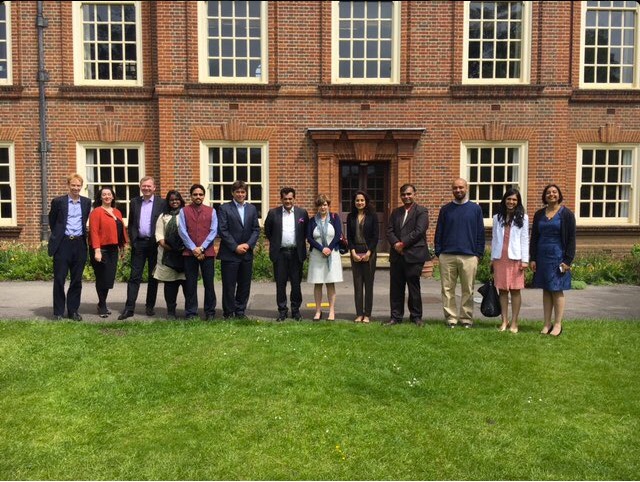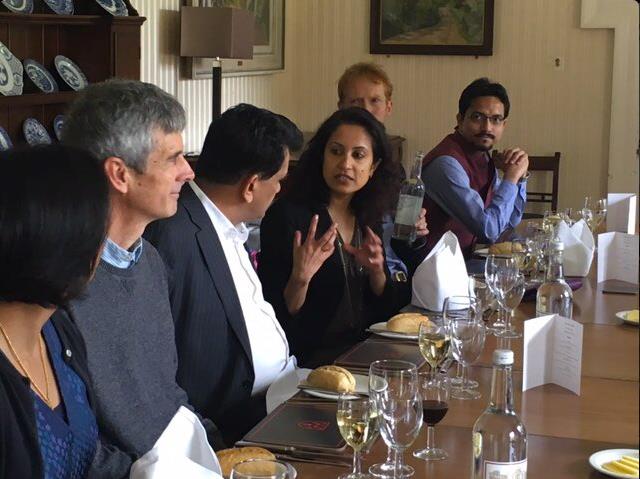 On Friday the 20th May 2016, Somerville’s Oxford India Centre for Sustainable Development (OICSD) Scholars, Deepa Kurup (2015, MPhil Development Studies), Ranu Sinha (MPhil Water Science, Policy and Management) and Somerville undergraduate Arindam Bannerjee (2015, MPhil Public Policy) were honoured to meet Mr Amitabh Kant, CEO of the National Institution for Transforming India (NITI Aayog) and discuss issues surrounding India’s Sustainable Development.
On Friday the 20th May 2016, Somerville’s Oxford India Centre for Sustainable Development (OICSD) Scholars, Deepa Kurup (2015, MPhil Development Studies), Ranu Sinha (MPhil Water Science, Policy and Management) and Somerville undergraduate Arindam Bannerjee (2015, MPhil Public Policy) were honoured to meet Mr Amitabh Kant, CEO of the National Institution for Transforming India (NITI Aayog) and discuss issues surrounding India’s Sustainable Development.
Other Somervillians present were Principal, Dr Alice Prochaska; Fellow and Tutor in Medicine, Professor Daniel Anthony; post-doctoral Research Fellow, Dr Siddharth Arora; Fellow and Tutor in Engineering Science, Professor Bhaskar Choubey; Senior Research Fellow in Plant Sciences, Professor Phillip Poole; Fellow and Tutor in Plant Sciences, Professor Renier van der Hoorn; OICSD’s Research Director, Dr Alfred Gathorne-Hardy; Director of Development, Sara Kalim; OICSD’s Scholarships and Partnerships Advisor, Ranjita Rajan and Programme Director of the Margaret Thatcher Scholarship Trust, Anita Bharucha.
During the lunch in the Senior Common Room’s Private Dining Room, Amitabh Kant, Scholars and Fellows discussed the problems of energy storage in India – specifically when associated with micro grids in rural areas. They agreed that it is essential to increase the efficiency of intermittent renewable energy sources such as solar power.
Another key sustainable development issue in India is water management. Amitabh Kant emphasised that restoring many of the existing tanks (reservoirs), coupled with good social control of water, could do a considerable amount to reduce water stress. Ranu Sinha added that many of the present projects, especially those associated with catchment level irrigation schemes, need better analysis to check how well they work at the district and household level. She is currently doing just such analysis using data from a recent World Bank sponsored irrigation project.
Amitabh Kant became CEO of NITI Aayog, the premier policy Think Tank of the Government of India, in 2016. Their 17 stated long-term sustainable development goals are:
- No poverty
- Zero Hunger
- Good Health and well-being
- Quality education
- Gender equality
- Clean water and sanitation
- Affordable and clean energy
- Decent work and economic growth
- Industry, innovation and infrastructure
- Reduced inequalities
- Sustainable cities and communities
- Responsible consumption and production
- Climate action
- Life below water
- Life on and
- Peace, justice and strong institutions
- Partnerships
The Oxford India Centre for Sustainable Development was established, with support from the Government of India, to provide fully-funded scholarships to top Indian graduate students. It is currently home to a thriving postgraduate and postdoctoral programme for talented Indian graduate students who seek to lead change to address issues of urgent global concern. The OICSD’s mission is to advance India’s sustainable growth and development, through collaborative interdisciplinary research, postgraduate training, and practice-focused engagement with leaders from all sectors.

